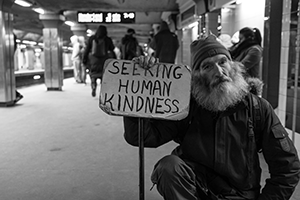by Arthur Paul Patterson
WITH ALL OUR discussions about how to relate responsibly and with spiritual maturity toward society, various themes have been creeping out of my mental woodwork, converging, and making me reflect upon my feelings about society and my attitudes and behaviours toward it.
One Wednesday night we discussed the classical virtue of kindness. I made the connection between my attitude and behaviour of relative isolation from society and my lack of felt experiences of kindness. This insight did not come out of a "poor me" impulse; it was just an observation on the link between my choice of withdrawal and its consequences.
Listening to my reflections you could tell that I didn't have a high regard for kindness. I have taken kindness to be a highly suspect virtue because I envision it at its worst: a superficial and manipulative manifestation. Kindness seemed to me the polar opposite of authenticity; a very self-centered emotion in fact. Not without regret about being so cynical, I see kindness as usually given with a paternal, superior attitude or in order to gain recognition. Have I been counselling too long or what?
Kindred Souls
Photo by Dawid Zawila
As the discussion moved away from our gripes about its collective manifestation and deepened into a meditation on the roots of kindness, I began to realize what I have so superficially dismissed. Kindness, even etymologically, suggests kindred souls and a profound perception of unity with others. As our definition of "others" expanded to include the entire creation, the virtue took on an extremely loving, authentic embrace, and an almost mystical way of thinking. Why would I choose to detach myself from this?
I felt ashamed to admit that I was steeled against kindness because the anticipation of being deeply disappointed by its imitations and corruptions plummeted me into smaller and smaller safe havens where the virtue could be encountered. In the end, I sit alone cut off from kindness by fear, mistrust and a lack of faith. This is a pretty ingrained pattern. I wondered how I could break free, or be broken free, from it.
A few days later I read in the Luke 10 about the mission of the seventy-two, an early first century band of individuals who followed Jesus of Nazareth. For all the theological gobbledygook around what mission means, it seemed to me, at least this morning, to be summarized as the extension of kindness as far and wide as it will flow. It was and is a kindness of the deepest kind, a kingdom kindness of unity available through the message of good news. This kindness heals broken people by unifying them and including them in the effort of passing kindness on to others who are open to it.
Without Expectation

As I read the passage, I felt that the author was not unaware of my fears that kindness might be disguised or rejected. In fact, a large portion of the story spoke of the rejection of this kingdom kindness. The extension of kindness requires risk, a risk equivalent of that which a lamb experiences when living among wolves. This is the risk of one who comes to another assuming a kindred consciousness only to be turned away - or worse. Kindness is a free gift but its rejection doesn't nullify it or render it powerless. Kindness, like all kingdom virtues, can only be received in grace, no strings attached; when it is offered and refused the refusal is accepted. Pushing kindness, just as pushing the kingdom, mars its authentic nature; it can only be offered and received in humility.

Photo by Matt Collamer
Jesus Christ offered kindness of the deepest sort and was crucified. The value of his kindness can be found in his sacrifice, in his kind willingness to accept rejection. Isn't this exactly where my own desire to receive and give kindness gets hung up on my own comfort? I want to be kind and I want to be open to kindness but I place a proviso on it, and thus, insulate others and myself from its power. I have decided that if kindness is rejected or distorted I ought to quit seeking or giving it. I have fallen into shallowness and into superficiality concerning kindness. It is powerful, it is healing, and yet it is free to be rejected or accepted. I am also free to offer it and receive it but this freedom comes only on the heels of risk - the unifying risk of being one with my spiritual kindred, the seventy-two and all that follow their example.

photo by Dmitry Ratushny
